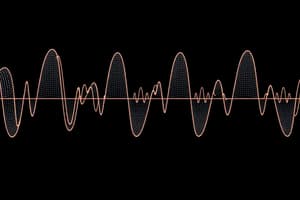Podcast
Questions and Answers
What is the primary measurement used for sound frequency?
What is the primary measurement used for sound frequency?
- Hertz (correct)
- Decibels
- Amplitude
- Volume
Sound waves can only travel through gases.
Sound waves can only travel through gases.
False (B)
What term is used to describe an unpleasant sound?
What term is used to describe an unpleasant sound?
Noise
The measure of energy in a sound is called __________.
The measure of energy in a sound is called __________.
Match the following terms with their definitions:
Match the following terms with their definitions:
What part of the ear catches sound waves?
What part of the ear catches sound waves?
An echo is created when sound waves are absorbed by a solid object.
An echo is created when sound waves are absorbed by a solid object.
Name one material through which sound vibrations travel.
Name one material through which sound vibrations travel.
When sound waves make the eardrum vibrate, the vibrations travel through tiny bones in the ______.
When sound waves make the eardrum vibrate, the vibrations travel through tiny bones in the ______.
Match the following scenarios with their descriptions:
Match the following scenarios with their descriptions:
Flashcards are hidden until you start studying
Study Notes
Sound: Movement Energy
- Sound is a form of movement energy.
- Unpleasant sounds are called noise.
- The scientific study of sound is called acoustics.
How Sounds Travel
- Sound travels through the air in waves, caused by vibrations.
- The sound waves move outward from the vibrating source.
- Sound waves can travel through solids, liquids, and gases.
- The loudness –volume- of a sound is measured in decibels (dB).
How We Hear
- Sound waves travel through the air until they reach our ears.
- The outer ear collects the sound waves and channels them through the ear canal.
- The eardrum, a thin piece of skin inside the ear, vibrates when sound waves hit it.
- The vibrations travel through tiny bones in the middle ear.
- This vibration travels to the inner ear.
- A nerve carries a message about the sound to the brain.
- The brain processes the message, allowing us to hear the sound.
Reflections and Vibrations
- An echo occurs when sound waves bounce back from a solid object.
- An echo can be heard best in a cave because the enclosed space prevents other sounds from interfering.
- Humans can hear and feel sound vibrations, especially near loud sources such as trains.
- Deaf people can feel sound vibrations in their bodies even though they cannot hear them.
- Sound vibrations travel through different materials including air, water, plastic, metal, and wood.
- Sound vibrations travel better through some materials than others.
Studying That Suits You
Use AI to generate personalized quizzes and flashcards to suit your learning preferences.




